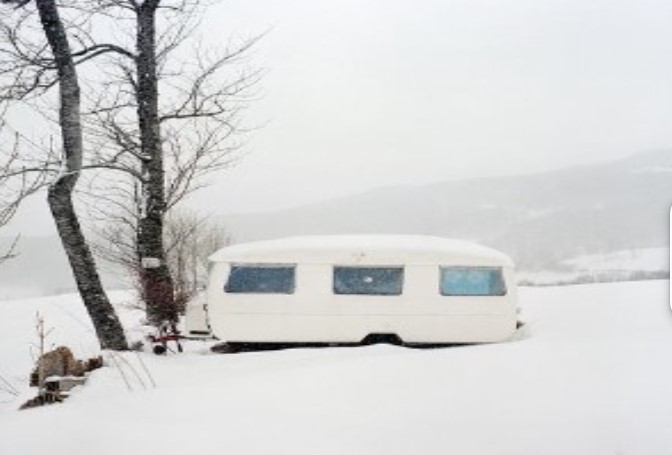Recreational vehicles (RVs) are a symbol of freedom and adventure, allowing enthusiasts to hit the open road and explore the great outdoors. However, as winter approaches, RV owners need to be mindful of the potential hazards posed by cold weather, particularly to their RV tires. Understanding the effects of freezing temperatures and taking proactive steps to protect your RV tires can ensure a smoother journey and extend the lifespan of these crucial components.

Understanding The Effects Of Cold Weather On Tires
Cold weather can have a significant impact on the performance and durability of RV tires. One of the most noticeable effects is a decrease in tire pressure. As temperatures drop, the air inside the tires compresses, causing a decrease in pressure. This can lead to underinflated tires, which can affect handling, fuel efficiency, and even lead to tire blowouts.
Additionally, the freezing and thawing cycles that occur in cold weather can also cause damage to tires. The repeated contraction and expansion of the rubber can weaken the tire’s structure and shorten its lifespan. This can make tires more prone to punctures and tread wear. Furthermore, cold weather can increase the risk of tire cracking and dry rot, as the rubber becomes more brittle in low temperatures.
Exposure to ice and road salt, commonly used for icy road conditions, can also damage tires. Salt can corrode and weaken the tire’s materials, causing potential structural failures. This makes it important for RV owners to carefully monitor their tires and take preventative measures during cold weather to ensure their safety and longevity.
Steps To Protect Your RV Tires
One crucial aspect of maintaining your RV and ensuring its safe travels is properly caring for your tires. To keep your tires in their best condition, it is essential to follow a few simple steps.
Keep Tires Properly Inflated
One of the most important steps to protect your RV tires is by keeping them properly inflated. This not only prevents blowouts and uneven wear, but it also improves fuel efficiency and handling. To ensure proper inflation, it is recommended to check tire pressure at least once a month and before every trip. Invest in a quality tire pressure gauge and refer to the recommended pressure for your specific RV model. Additionally, make sure to not overload your RV with excess weight, as this can put unnecessary strain on your tires. Regularly inspecting for any signs of damage or wear and rotating tires every 5,000 miles can also help prolong their lifespan.
Invest In Proper Tire Covers
One easy and effective way to protect your tires is by investing in proper tire covers. These covers not only shield the tires from harsh winter weather elements like snow, ice, and freezing temperatures, but also prevent damage from UV rays during sunny winter days. Additionally, tire covers prevent tires from drying out and cracking due to exposure to cold air, which can lead to blowouts and costly repairs.

Use Wheel Chocks
Before parking your RV for an extended period of time in the winter, make sure to place wheel chocks on both sides of each tire. This will help to keep your RV in a stationary position and reduce the risk of your tires developing flat spots or bulges from sitting in one spot for too long. Additionally, using wheel chocks can also prevent your RV from shifting and causing damage to other components, such as the leveling jacks or suspension.
Park On Level Ground
In order to protect your RV tires during the winter months, one important step is to park your vehicle on level ground. This may seem like a simple task, but it can greatly impact the overall health and longevity of your tires. When a vehicle is parked on an uneven surface, the weight of the RV can be distributed unevenly, causing unnecessary strain on certain tires. This strain can lead to premature wear and tear, and even potential blowouts.
By parking on level ground, you ensure that the weight of your RV is evenly distributed, thus reducing the risk of tire damage. Additionally, parking on level ground can also make it easier to properly position and stabilize your RV, making it more resistant to strong winds and other harsh weather conditions that often occur during the winter months.
Rotate Your Tires
Rotating your RV tires during winter months is an essential step to ensuring the longevity and safety of your vehicle. With colder temperatures, tire pressure can decrease and the rubber can become more brittle, making them more prone to wear and tear. Therefore, it is crucial to rotate your tires regularly to distribute the weight and wear evenly, preventing excessive deterioration.
The recommended rotation intervals may vary depending on your vehicle and driving habits, but it is generally recommended to rotate your tires every 5,000-8,000 miles or every 6 months. It is also important to follow the correct rotation techniques, such as switching the front tires to the back and vice versa, to promote even wear.
Additional Tips For Cold Weather Tire Care
Consider Investing In Winter Tires
While your all-season tires are likely sufficient for light snow and ice, investing in a set of winter tires can greatly improve your vehicle’s performance in harsh winter conditions. Winter tires are specifically designed with a different tread pattern that provides better traction and grip on snowy and icy roads.
They also use a special rubber compound that remains flexible in low temperatures, allowing them to maintain their grip on the road. Additionally, investing in a full set of winter tires can extend the lifespan of your regular tires as they are not constantly being used in harsh conditions. It’s also important to properly store your winter tires during the warmer months to ensure they are in good condition for the next winter season.
Avoid Prolonged Exposure To Extreme Cold
If possible, avoid exposing your RV to prolonged periods of extreme cold. Extended exposure to harsh winter conditions can accelerate tire aging and increase the risk of damage.
Prepare Tires For Storage During The Off-Season
Before storing your RV, make sure to thoroughly clean the tires with warm, soapy water and inspect them for any cracks or damage. It’s also recommended to over-inflate the tires by 10-15% to compensate for any air loss during storage. If possible, take your RV out for a short drive before storing it to help rotate the tires and distribute the weight evenly. Storing your RV on flat, even surfaces can also prevent the tires from developing flat spots.

Conclusion
Taking proactive measures to protect your RV’s tires during cold weather is essential for ensuring a safe and enjoyable travel experience. By understanding the effects of freezing temperatures on tires and implementing the recommended steps, RV owners can safeguard their investment, enhance safety, and extend the lifespan of their tires. Whether you’re a seasoned traveler or a weekend adventurer, a little care for your RV’s tires can go a long way in preserving the integrity of your vehicle and maximizing your on-the-road enjoyment.

